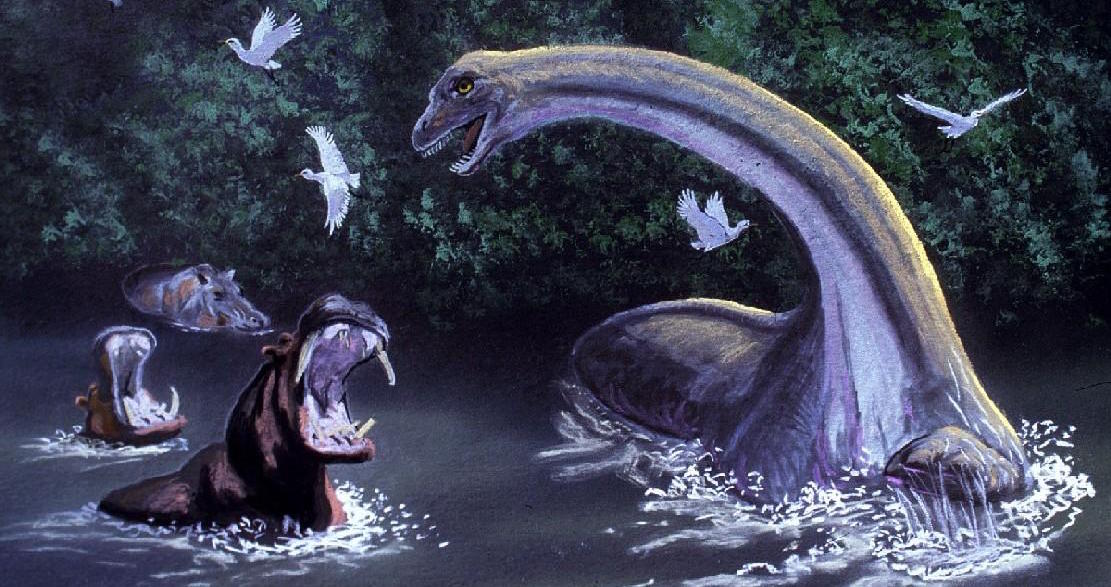Appendix:
For centuries, rumors of an enormous, violent, long-necked monster have swirled around Africa’s Congo Basin. Local tribes have pointed out images of brontosaurus as a dead ringer. Now, explorers believe the creature could be a boon for science or a mighty blow to evolution theory. What is the Mokèlé-mbèmbé?
While the general impression is that the Mokèlé-mbèmbé is a sauropod dinosaur akin to Brontosaurus, many witnesses are adamant that the creature has horns or tusks, three-clawed feet, and that it spends most of its time submerged under the water. If you take a composite of the different descriptions, the creature would look something like this:

But there’ve been dozens of descriptions over the last hundred years or so. More than I can fit even in this companion post. However, there is a thorough history of Mokèlé-mbèmbé sightings listed on Wikipedia, and I recommend giving it a read because it’s surprisingly entertaining.
Below are a couple of highlights from the Mokèlé-mbèmbé timeline that I talk about in today’s episode:

1909: Hagenbeck
I mentioned in today’s episode that Carl Hagenbeck unveiled the 66-foot statue of a diplodocus at his Hamburg zoo. Here’s a postcard photo of the statue, which was scaled up from a sculpture by famed dinosaur artist Charles Knight.

1932: Sanderson
Ivan Sanderson and Bernard Heuvelmans also dedicated some of their cryptozoological careers to the beast. You may recall from the exhibit on the Minnesota Iceman that Sanderson got his start in cryptozoology after believing himself to have been attacked by the kongamato, an alleged African living pterosaur! His interest in Mokèlé-mbèmbé was no coincidence.

1988: Japanese expedition
The most conclusive evidence for the existence of the Mokèlé-mbèmbé is this aerial footage of a strange object swimming across Lake Tele. The footage was captured by a Japanese documentary film crew shooting a story about the monster. It’s about half a minute of footage, depicting an odd-looking form making its way through the water, leaving a considerable wake behind. However, skeptics have demonstrated that you can get near-identical visual from men paddling a canoe or even swimming elephants.
2009: MonsterQuest
In March 2009, the History Channel aired an episode of MonsterQuest featuring many of the major players mentioned in today’s episode, as well as a few of the authors of the source links listed below. The show followed William Gibbons on an expedition to search for the creature, suspiciously leaving out his Young Earth Creationist affiliation and motivations. No conclusive evidence of the creature was found, though the expedition did turn up sonar readings of long, serpentine shapes underwater.
Sources:
The hunt for Mokele-mbembe: Congo’s Loch Ness Monster by Cordelia Hebblethwaite
Misreading the Mokele-Mbembe (the Mokele-Mbembe, Part 1) by Darren Naish
In Search of the Congo Dinosaur by William J. Gibbons
Living Sauropods? No Way by Brian Switek
A THIRD OF ‘EXTINCT’ MAMMALS MAY STILL BE ALIVE by Brian Switek
MonsterTalk Interview with Donald Prothero
Museum Management:
Museum theme by Michael Guy Bowman
Listen to more at: bowman.bandcamp.com
Rachel: Designer #UkuleleWitch @rachelvice
Tour Guide: Emery Coolcats
Twitter: @natmysterycast | Email: natmysterypodcast@gmail.com | Home: pome-mag.com/category/pomecast
Follow the show on iTunes or Soundcloud!
Museum of Natural Mystery is part of the POMEcast network, and thanks a million to the ladies of POME for helping this show get up and running! But above all, thank you for listening!




